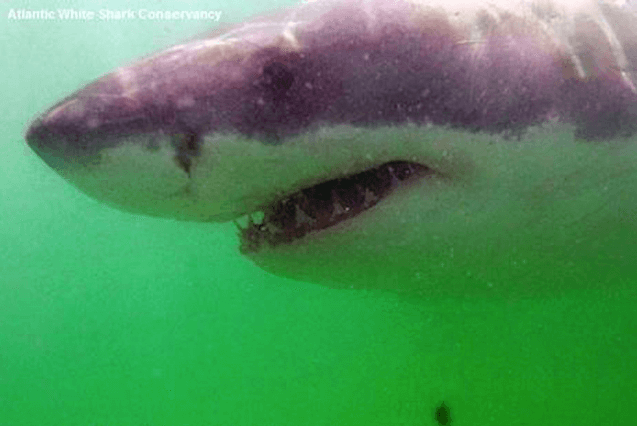A new visitor arrived off the shores of Cape Cod earlier this week; a great white sharknamed “Freckles.”
The 15-foot Great White was spotted off the coast of Orleans on Monday, pictures were released on Tuesday morning.
Greg Skomal, a senior fisheries biologist with Massachusetts Marine Fisheries who has done extensive Great Whileresearch told Metro what tourists should be looking out for this season. “Most of the sharks we see are close to groups of seals” Skomal said. “So one of the more obvious guidelines we tell people is don’t swim near large numbers of seals. The sharks are here to eat the seals.” Also read:Tread carefully: The New England Aquarium offers tips on how to avoid shark attacks Freckles is the first new shark to be spotted on the cape this year.
According to the Massachusetts Marine Fisheries, there were 68 individual sharks spotted last summer.
“Its really hard for us to guess how many we are going to see and it changes from year to year,”Skomal said. “We wont know about this year until October, but my best guess is that we are likely to see similar numbers this summer.” For some, a shark sighting is exciting and not scary at all. Cape Cod Shark Adventures aims to give tourist the chance to interact with the animals and see them in their natural wildlife habitats. This year especially, with the 40th anniversary of Jaws its hard to say if the mammals will be scaring away the tourists away, or bringing them in for a closer look. Plenty of fins in the sea, says boat captain
If you see a fin poking out of the water while you’re out boating or at the beach this season, don’t assume it’s a great white, said Greg Sears, boat captain for the Mass Bay Guides charter fishing company in Scituate. “The other day I was out and saw 20 basking sharks with big, giant fins. Everyone in the boat thought they were great whites, but they’re not,” said Sears, who said he can identify five or six species of shark by looking at their fins. Fishing for great white sharks is illegal, and the World Wildlife Fund lists the species as vulnerable to extinction. Even for experienced fishermen though, he said, great whites would make challenging prey. A handful of times each summer, he said, he gets to see one of the fierce predators up close.
“Sometimes they come close to the boat, sometimes they don’t,” he said. “Last year, we had a blue shark on the line, which is about eight feet long. Then out from the depths comes the white shark looking to eat the blue shark.” Shark attacks are very rare, and the predatory fish pose basically no danger to humans, with a few notable exceptions. A great white gave kayakers a scare near Plymouth last year. To stay safe, Sears echoed Skomal in repeating the advice given to Massachusetts beachgoers annually around this time of year: stay away from seals.
That’s where Freckles will be headed while she spends time close to the Cape this year, he said.
“[Freckles] is a shark that’s here for one reason, and that’s to eat seals. She’s going to be where the seals are or anything that looks like a seal,” Sears said. “Sharks’ brains are about the size of your thumbnail and they’ve got two things on their mind, and that’s to eat and breed. They’re not here to breed, they’re here to eat.”
Great White shark spotted in Cape Cod dubbed ‘Freckles’

Atlantic White Shark Conservancy
The toothy visitor swam away, he said.

















